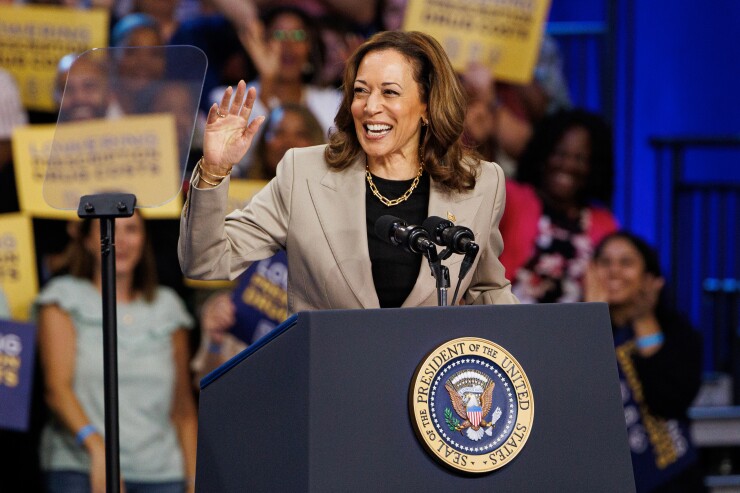Vice President Kamala Harris will propose sweeping new federal subsidies for parents, homebuyers, and Americans with low-incomes alongside new programs to curb increases in rent and grocery prices as she seeks to convince voters that she would act swiftly to address one of their top concerns — rising consumer costs.
The Democratic nominee, who will unveil the plan Friday afternoon in North Carolina as part of her three-month sprint to Election Day, plans to target some of the core expenses of daily life — the costs of food, housing and prescription drugs — while overhauling the federal tax code.
Harris' plan would expand the child tax credit to $3,600 from $2,000 per dependent, with a super-sized $6,000 credit for newborns. Harris also proposes expanding the Earned Income Tax Credit for low-wage workers who don't have children, and increasing subsidies for those who purchase insurance on federal health exchanges.
The vice president also envisions new price controls on groceries, and expanding limits on out-of-pocket prescription drug prices to all Americans. Tens of billions of federal dollars would be spent to improve the supply of federal housing, while Harris is pledging to implement new rules to prevent corporate and landlord price gouging.
The effort comes as the Democratic presidential nominee rapidly tries to define herself for the American public, with less than three months until the November election. Her message is an acknowledgment that many Americans are unhappy with the economic status quo, and a marked shift from President Joe Biden's rigorous defense of their administration's economic record, which contributed to Democratic leaders' concerns that voters saw him as out of touch.
Economists are divided on the practicality and efficacy of some of Harris' proposals - and particularly price cap efforts.
The World Bank in 2022 described temporary price controls as "the second best option," given they can be inefficient and costly, though the bank acknowledges they have a role in keeping inflation expectations in check — provided they are designed well. Her $25,000 proposal to assist first-time home owners secure mortgages threatens to further push up housing prices.
Other elements of Harris' proposals would carry a substantial price tag.
The expanded child tax credit alone would likely cost hundreds of billions or trillions of dollars over the next decade, though it could garner bipartisan support: Trump's running mate, Senator JD Vance, also proposed increasing the credit to $5,000 per child. The politically popular tax break is set to decrease in value at the end of 2025, meaning that whoever wins the White House will face pressure to revive it.
Still, advisors believe that concentrating on pocketbook issues offers a favorable frame to voters who still rank the economy among their biggest concerns. It's also an opportunity for Harris to highlight the years she spent as California attorney general advocating for consumers in price-fixing cases.
And even as economists point to supply-chain disruptions and the federal government's pandemic-era stimulus spending as major factors in price increases, Democrats argue that inflation, which peaked at a 40-year high of 9.1% in mid-2022, has been driven by corporate profit-padding. Many Americans agree, Harris' advisors have found in polling and focus groups.
Trump, looking to counter expected attention regarding the proposals, held a press conference Thursday at his New Jersey golf club where he labeled the Harris plan as "communist" and warned efforts to control grocery prices would lead to "food shortages, rationing, hunger, dramatically more inflation."
Light on specifics
While Harris will offer some policy details in her speech, slated for Friday afternoon in Raleigh, she's not expected to weigh down the address with too many specifics. Instead, allies say, it's more important politically to deliver a message showing that she understands voters' economic struggles and will fight to alleviate them.
"We're more interested in the storytelling than the precise policy," said Adam Green, co-founder of the Progressive Change Campaign Committee, which has worked closely with the Harris campaign on economic messaging, drawing on weekly polling conducted with Data for Progress. Harris is right to start with grocery prices, he said, because they are "the number-one pain point in peoples' lives by far."
Harris heads into Friday's speech with a narrow polling advantage on the economy, a rare position for a Democratic presidential candidate.
Forty-two percent of registered voters surveyed for a Financial Times-University of Michigan Ross School of Business poll released Sunday said they trust her to handle the economy, while 41% said former President Donald Trump would do a better job. Biden trailed Trump by six points when the survey was last conducted, in July.
Economic wariness
Recent U.S. economic data has generally been strong. Stocks climbed Thursday after reports showed that retail spending and the labor market continue to be healthy. Underlying U.S. inflation eased on an annual basis in July for the fourth consecutive month, the Bureau of Labor Statistics reported Wednesday, keeping the Federal Reserve on track to cut interest rates in September.
Still, there have been a few signs of concern that have analysts raising the odds of a recession. The unemployment rate rose in July to 4.3%, the highest level in three years.
Despite the generally positive economic news, voters have a bleak outlook. In the Financial Times-University of Michigan poll, 73% of those surveyed described American economic conditions as negative.
While Harris is promising to fight drugmakers from the Oval Office, she can also point to what the Biden administration has already done to cut costs. For the first time since he dropped out of the presidential race, Biden joined Harris for a public appearance on Thursday to roll out the lower prices secured from pharmaceutical companies for participants in Medicare Part D.
Harris says she would push the government to negotiate additional savings faster, and cap the monthly cost of insulin at $35 for all Americans.






